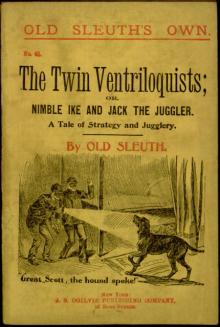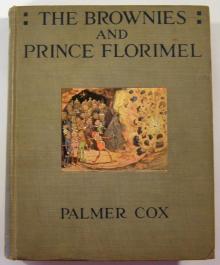- Home
- Amanda M. Douglas
A Little Girl in Old Washington
A Little Girl in Old Washington Read online
Produced by Melissa McDaniel and the Online DistributedProofreading Team at https://www.pgdp.net (This file wasproduced from images generously made available by TheInternet Archive)
Transcriber's Note:
Inconsistent hyphenation and spelling in the original document have been preserved. Obvious typographical errors have been corrected.
Italic text is denoted by _underscores_.
On page 50, "race ruffles" should possibly be "lace ruffles".
BY THE SAME AUTHOR.
A LITTLE GIRL IN OLD NEW YORK. HANNAH ANN: A SEQUEL. A LITTLE GIRL IN OLD BOSTON. A LITTLE GIRL IN OLD PHILADELPHIA. A LITTLE GIRL IN OLD WASHINGTON.
_SHERBURNE STORIES._
SHERBURNE HOUSE. LYNDELL SHERBURNE. SHERBURNE COUSINS. A SHERBURNE ROMANCE. THE MISTRESS OF SHERBURNE. THE CHILDREN AT SHERBURNE HOUSE. SHERBURNE GIRLS. THE HEIR OF SHERBURNE.
A LITTLE GIRL IN OLD WASHINGTON
BY AMANDA M. DOUGLAS
AUTHOR OF "A LITTLE GIRL IN OLD NEW YORK," "SHERBURNE STORIES," ETC., ETC.
NEW YORK DODD, MEAD AND COMPANY 1900
COPYRIGHT, 1900, BY DODD, MEAD AND COMPANY.
THE MERSHON COMPANY PRESS, RAHWAY, N. J.
JAQUELINE BAKER BEALL:
To you, whose ancestors made worthy efforts in the earlier historyof the South, and lived romances, this little story is affectionatelyinscribed.
AMANDA M. DOUGLAS. NEWARK, N. J.
CONTENTS.
CHAPTER PAGE I. A New Home, 1 II. The Pineries, 15 III. Apples of Discord, 28 IV. A New President, 42 V. Roger Carrington, 56 VI. A Touch of Nature, 70 VII. The Beginning of a Love Story, 86 VIII. An Angry Father, 99 IX. The Weaker Vessel, 116 X. A Christmas Augury, 130 XI. The Thorns that Beset Love, 148 XII. A Talk of Weddings, 161 XIII. Lovers and Lovers, 175 XIV. Jaqueline, 191 XV. A Small Hero, 207 XVI. In Old Washington, 219 XVII. The Flag of Victory, 240 XVIII. Of Many Things, 253 XIX. In the Midst of War, 265 XX. The Old Story Ever New, 283 XXI. Annis, 298
A LITTLE GIRL IN OLD WASHINGTON.
CHAPTER I.
A NEW HOME.
"But you will have to take sides," declared Jaqueline Mason, "and itwould be ungrateful if you did not take our side. You are going to livehere; you really belong to us, you know. Your mother was own cousin toour dear mother, and Patty was named after her----"
"I don't see why I should be called Patty when you've given up Jack andmake such a fuss!" interrupted a slim, unformed girl, who was nearly astall as the first speaker.
"Well, Miss Patty, I am sixteen and in long gowns; and next winter Iexpect to go to balls and parties, and be presented at the White House.Oh, I wish it was a court!"
A young fellow, astride the low window seat, laughed with a teasing,bantering sound in his voice, and his deep eyes were alight with mirth.
"You think you are a great patriot, Jacky, but you hanker after thefleshpots of Egypt and royalty, when we have fought for our freedomand gained our independence and set a noble example to the downtroddennations of Europe. Sighing for a king and a court!"
"I'm not sighing. One can think of a thing without wishing it----"
"And he called you Jacky!" cried Patty, with a certain triumph ringingin her tone.
"Father said you were not to." Jaqueline Mason raised her head withdignity. "I used to think it rather funny when I was romping round, andit teased Aunt Catharine; but I hate it now, and I've given up romping.There is a great difference."
"And Cousin Annis is eager to hear about _her_ side. You hardly knowwhich side you are on yourself."
She gave him a withering look, and turned to the little girl who stoodin a shrinking attitude, and whose eyes had a certain lustrousness, asif tears were in their limpid depths.
"I wish you wouldn't interrupt, Louis Mason! I am trying to explain.Grandfather Floyd isn't our very own grandfather--he marriedgrandmother--and he believes we shouldn't really have separated fromEngland, or at least we should have modeled our government upon hersand had a king. He thought Washington ought to have stood up for somegrandeur and state, and he is afraid now we shall all go to ruin.He never did like President Jefferson. But you are too little tounderstand politics, Annis, and I was going to explain--father andAunt Catharine are _own_ brother and sister; then there are five Floydchildren, uncle and aunt's too. You really are not related to them. Youare on our mother's side."
"Jaqueline, you will be qualified to write the genealogy of Virginia,"and Louis laughed mockingly.
The girl colored with vexation. "Well, everybody is married to almosteverybody else; and now your mother has married our father, and that ina way makes us sisters."
The little girl standing by the window, where the sunshine siftedflecks of gold through the green clustering vines, looked up wistfully.She had wished out in Kentucky that she had a sister, and now thatthree had welcomed her and taken possession of her, she was not surethat she wanted sisters. She had slept with Varina, who was about herown age, but who had not taken to her very cordially. There was a stillyounger child, a boy, curled upon the next window ledge, poring over anold copy of Froissart, dog-eared and well worn. Varina was petting twodoves, who arched their necks and strutted about.
"Yes, people get queerly married, up or down or crosswise. I mean tomarry someone quite new and strange. But we were glad that father chosea cousin of our own dear mother's, and I am sure we shall all like her.What do you suppose they are about! Why don't they come to breakfast?"
This was the great dining room. Four windows faced the east, two thesouth, shaded by the wide porch roof and the vines. There was a massivesideboard and a china closet with glass doors, wherein were many familyheirlooms. The antlers and head of a great buck were suspended over themantel, which was graced by a pair of silver candlesticks with severalbranches and a snuffers and tray. There was a large, roomy sofa andsome high-backed chairs, quite stiff enough for the dames of earlyeighteen hundred. The floor was bare, but laid with various-coloredwoods. It had a hospitable air, altogether, in spite of its massivefurnishing. The table was set for breakfast, and a tall silver coffeeurn graced one end of it.
There was a stir in the hall, and the sound of servants' voicesmingling with a mellow masculine greeting. The little girl made a rushfor her own dear mother, and ran into Chloe, but her new father rescuedher from harm, since the woman was carrying a dish of savory friedfish, followed by other servants with numerous viands.
He lifted her in his arms and kissed her, and her mother bent over togive her another caress. Then he stood her down, and she almost buriedher face in her mother's gown and impeded her progress.
"Well, chicken," and the round, cheery voice sounded as if a laugh wasat the back of it, ready for the slightest provocation, "how does itseem with all these brothers and sisters? For that's what you are tobe. Children, here is your new mother, by daylight. Take a good lookat her and love her, tho
ugh she will be more like a big sister than amother. I could have been her father. For when I first saw her she wasno older than you, Patty."
The children thronged about her. Second marriages were quite commonoccurrences, and the children of those days were expected to acceptand make the best of them. Miss Catharine Mason had taken excellentcare of her brother's household, and now gone to Williamsburg to takecharge of the Rev. William Conway's rectory and be a mother to thethree children. There had been a governess, a certain Miss Betts, fromfarther North, who somehow could not easily adapt herself to Southernways, and a rather turbulent household. There had been numerouscomplaints, and at the summer vacation she had resigned. Miss Jaquelinehad in a measure taken the head of the house, with Maum Chloe and MammyPhil, who had brought up the younger part of the flock and comfortedthe elders in times of difficulty and trouble.
The new mother held out her arms. Jaqueline and Patty gave her a warmembrace. Louis shook hands with the grace of a gentleman, and smiledout of fine soft-brown eyes. A very good-looking young fellow ofeighteen, home from his first college year.
"Oh, children, I hope you will all love me, for I have had a sad,lonely time for the last five years. It seems so good to get to a realhome, and have a corner in your father's big heart. And we will all tryto make each other happy."
She was rather tall and slim, this new Mrs. Mason, with light-brownhair and blue eyes, and a sweet, wistful smile. Nine years before this,she and her husband and baby had gone out to Kentucky with a colony,and though the valley was extraordinarily beautiful and fertile theyhad known many hardships and more than one Indian skirmish. Still, theywere young and happy and prospering when death came to Philip FrancoisBouvier, and for five years she had been full of perplexity and sorrow,when the coming of her dead cousin's husband had brought a glimpse ofrest and the proffer of a haven of delight.
"And this little one." She reached out her hand to Varina. "You andAnnis cannot be far apart in age, and will be excellent friends, Itrust. Was there not----" glancing around.
"Charles, put up your book and come and speak to your new mother.And then to breakfast. I shouldn't blame Chloe if she put us on shortcommons this morning, we are shamefully late. Your mother and I hadseveral points to discuss. We will do better to-morrow, Chloe. I hopeyou have not allowed these marauders to tear down the house nor tear upthe garden. Ah, good-morning, Homer."
Homer was the tall, stately major-domo. The Indian blood in his veinsshowed in his erect stature, his straight nose, and his hair, which,though quite frosty and curly, was not kinky. And Homer felt as proudof his blood as any of the Rolfe descendants.
They were all settled about the table presently--a household to beproud of. Mrs. Mason took her place at the urn; Annis had a seat besideher. Varina was on one side of her father, Charles on the other. Afine-appearing flock, truly; Jaqueline and Patricia giving promise ofmuch beauty. Louis was tall and manly, though one could see he had beenbitten with the follies of early youth by a certain aspect of finerythat young men affected.
The meal was long and entertaining to the partakers. There was so muchto tell. Many things had happened in the six weeks' absence of thehead of the house, and everybody running wild. True, the overseer was aman of judgment and foresight, and of wide experience, and the estatehad not suffered. Chloe had managed to keep what she called the "whiphand" of the house servants. It was the children who had suffered most.Indeed, if Aunt Catharine could have looked upon them now she wouldhave thought them demoralized beyond redemption.
But Squire Mason was an easy-going man, and had a feeling that mostthings come out right if you give them a chance. Prosperity is apt tomake one buoyant and cheerful. And though the country was in a bad wayand the rulers in high places were disputing as to whether it couldhold together, and there were no end of sinister predictions even amongthose who had borne the strain and burden of making a country. Butcrops had been excellent, and on the large estates everything needfulwas raised, so there was no stint. The Virginia planter, with his broadacres, had a kingdom in virtue of this plenteousness.
Mrs. Mason watched the two chattering girls, the little Varina, whoheld whispered confidences with her father, the abstracted boy Charles,surprising herself with a sort of desultory conversation with the youngman who was explaining the many changes in men and events and places innine years.
"And we have brought the Capitol to Washington," he said, with thedignity of his eighteen years. "You know there was a tremendous attemptto locate it at Baltimore."
"Yes. Baltimore is dear to me. All my young life was passed there."
"I suppose there were some good reasons, but we Southerners made agrand fight. We had Mr. Jefferson on our side. I think Virginia neverhad full credit for her brave share of the war. At all events we hadthe crowning victory, the surrender of Cornwallis."
"I have quite a desire to see Washington."
"It is so hard to get grants to go on with the buildings andimprovements. The country ought to have more enthusiasm. But theeastern States are not over-cordial yet. Why, there could have beennext to nothing done when you went away!"
"There had been some trouble with Major l'Enfant, I believe. Andeverybody was counting on a fortune for the ground."
"As they are yet," and the young man laughed. "Father has a tractof swamp and elder bushes. When the streets reach out to us and thepopulation increases, we may go in. At least some of us younger ones. Idon't suppose anything would induce father to give up the estate here?"
"You are right there, Louis. This old Randolph place will last my timeout," said his father, who had caught the last of the sentence. "We arenear enough, and can get over to see the shows, while we keep out ofthe quarrels. Some day it will be a fine town, and the country at largemay be proud of it. But there must be no end of money sunk in the bogs.We will go over and inspect it."
"I hope Mrs. Madison finds more for her comfort than Mrs. Adams did,"said Mrs. Mason, with a smile. "I can appreciate pioneer life."
"Mrs. Madison isn't lady of the White House absolutely, but she is sentfor to receive everybody. And she entertains delightfully herself. Youknow," Jaqueline said this to her new mother, "that Aunt Jane lives inthe City----"
"She has not yet made Aunt Jane's acquaintance, or, if she did, itwas when Aunt Jane was a mere child. You were here on a visit--when,Patricia?"
"Just before I was married, fifteen years ago, or nearly. And Jaquelinewas a little yellow-haired baby."
"Oh, how queer!" cried Patty.
"You see, mother was a widow some years, and her second family is stillquite young. Yes, Jane has married very well, a surveyor and civilengineer. But it will not do for us to sit over the breakfast table allday if we are going to mother's," and the squire rose, pulling himselftogether with a sort of shake.
"Must we go to-day?" Mrs. Mason's voice was beseeching.
"Oh, mother would consider it an unpardonable slight! She is a greatstickler for deference and attention, and all that. Yes, and it isa good long drive. We can return home by moonlight, however." He wascoming around to his wife's side. "We must take this little one andshow her to her grandparents. Rene, do you not want to go along?"
Varina looked undecided. She was not quite sure she wanted a new sisterso near her own age. She had been the pet and the plaything of thehousehold, and last night Mammy Phillis went over to the newcomer, whohad gone to bed for the first time in her life without being cuddled byher own dear mother.
The squire pinched his new little girl's cheek softly. She leaned itgently down in the hollow of his hand in a mute caress. He was veryfond of children.
There was the confusion of everyone rising, and all of them talking atonce, it seemed.
After her good night's sleep and her week of happiness Mrs. PatriciaMason looked both young and pretty, though now she was not much pasttwo-and-thirty.
"I want to ride over," declared Jaqueline; "I have not been in everso long. And Marion is to have a party on her birthday, early inSeptemb
er. What a pity Louis will be gone! She's desperately sweet onLouis."
The young man flushed scarlet.
"You can't marry your aunt any more than you can marry yourgrandmother," said his father in a teasing tone.
"Jack is always thinking about marrying," flung out the brother. "It'sa nasty way girls have."
"There! there! No disputing, or the new mother will think she hasfallen into a hornets' nest. Go and get ready. I'll take a glance atthe stables and see Dixon for a moment," and he turned away. But Louiscaught his arm and kept step with him.
"Well, what is it?" he asked rather impatiently. "Money again? Youyoung people think the well is exhaustless."
"No, it isn't money." His tone was a little husky. "Jerry is lame. Irode him rather hard one day----"
The squire smothered an oath. He had promised his young wife he wouldnot swear at everything. It _was_ a bad habit, a bad example to hisboys.
"How did that come about? I told you Jerry was not to be taken ontramps. You young fellows have no sense."
"I was over to Kenyon's one day. They bet her against Kenyon's mare. Itried to get out of it----"
"And you were beaten! Served you right! My poor Jerry!" with a touch ofdesperate anger in the tone.
"No, I won!" There was a ring of elation in the young voice. "He camein five seconds ahead. There was a great time, you may be sure, andKenyon was for trying it again. He thinks nothing can beat the mare. Ithink Jerry trod on something. His foot and leg have been swollen. Catohas him almost well, though."
"I meant to keep shady and enter him next year. I do believe if youhadn't beat I should just take it out of your hide," and the squirelaughed. "Now it will go abroad that I have a crack horse. Well--andwhat did Cato say?"
"He was lame the next morning, but Cato thought it wouldn't be much,and when he grew worse Cato worked over him faithfully. He is sure hewill be all right."
"You are beginning early, young man. Next time you let my especialhorse alone. Well, I'm glad it's no worse. But I won't have you turningout a horse jockey."
They had reached the stables, where two or three old men and half adozen negro boys were making a pretense of being busy, but they rushedto welcome the squire. Cato and Jerry were both interviewed, and whenthe master emerged with a pleasant face and scattered a handful ofcoppers for the small fry to chase about, Louis felt quite relieved,for, truth to tell, he had had several rather wretched days about hisfather's favorite.
The squire ordered up the carriage, and Julius came down with missy'scommands.
Annis had followed her mother up the broad staircase to the large,light room where a slim young colored girl was putting away variousarticles in drawers and closets. The small wardrobe had been increasedduring the brief time spent in Baltimore, but was not very extensiveyet.
When Randolph Mason had gone to Baltimore to settle the estate ofone of his wife's cousins, as he had been named executor, he foundPatricia Bouvier mentioned among the heirs. He recalled the pretty,attractive girl his wife had taken such an interest in, who had marriedan enthusiastic young French Huguenot, and some time after joined acolony of emigrants to the "New Countries," as the Middle West was thencalled.
"She was left a widow some years ago," said one of the relatives. "Shedid write about coming back, but it is a long journey for a woman anda little child. Latterly we have not heard. I dare say she is marriedagain."
There was a company going out to settle some boundary question and makesurveys, and on the spur of the moment the squire's adventurous bloodwas roused and he joined them. They had magnificent summer weather,and his enjoyment was intense. He found the little settlement and Mrs.Bouvier, who had known varying fortunes since her husband's death. Shehad been kindly cared for, and more than one man would gladly havemarried her, but her heart yearned for her own people. To take thejourney alone seemed too venturesome, and she well knew the perilsof frontier travel. So she had waited with a longing soul for somedeliverance. She would go back gladly.
There was no difficulty in disposing of her claim in the settlement.She bade good-by to the grave it had been a sad, sweet pleasure totend, and with her little girl and her delightful guide and convoy setout on the journey.
Before they reached Baltimore a new tie had sprung up between them.True, Squire Mason had thought occasionally during the last yearof marrying again. His sister Catharine had said to him before herdeparture:
"The best thing you can do, Randolph, is to marry soon. The girls willneed someone to supervise them and see that they make proper marriages.Mrs. Keen would be admirable, as she has no children. And there are theStormont girls; any of them would be suitable, since even Anne is notyoung. I wish I had taken this in hand before."
"I wish you were not going away, Catharine. My girls ought to be nearerto you than Mr. Conway's," he said ruefully.
"I will still do what I can for them. There is excellent society atWilliamsburg, and I can give them pleasant visits. But I never saw aman more in need of a wife than Mr. Conway. It's a good thing clergymenwear a surplice, for I am sure he never could tell whether he wasdecent or not. Surely it is a plain duty."
"And you leave me in the lurch?"
"But, you see, a clergyman needs a person well fitted for the position,which, I must say, every woman is not," with an air of complacency.
"And you think anyone will do for me!"
"How foolish you are, brother! I think no such thing. You certainlyhave sense enough to make a wise choice."
But he had not chosen, and now he thought he should like this sweet,sorrowful, tender Patricia. How bright he could make her life!
He was so strong, so sincere and cheerful. He made friends withshy Annis, who sat on his knee and was intensely interested in hisgirls--he always called them little. And before they reached Baltimorehe had asked Patricia to marry him, and Annis had consented to behis little girl. Mrs. Bouvier's small patrimony was to be settledon the child. But, then, she could not have imagined Mr. Mason beingmercenary.
Word had been sent to the household of the marriage. They had notthought of objecting. In the great drawing room there was a portrait oftheir mother in a white satin gown, with pearls about her neck. It hadbeen painted during a visit to London. They all went and looked at it,and wondered if the cousin Patricia would be anything like that!
"I don't believe she is as beautiful," declared Jaqueline.
There had been several delays on the latter part of the journey, andit was evening when the travelers reached home. The welcome had beena hearty one, and when supper was over Annis was nodding. It was pastVarina's bedtime. Charles had already stolen off.
"Take the children to bed, Phillis," said the master. "They're to besisters, so they may as well begin by sharing the same room. You won'tfeel lonesome, little Annis?"
"I'll go with her," said the mother in her soft voice.
"Nay." Randolph Mason put his hand on his wife's arm and kept her aprisoner. "Phillie is the best of mammies. And you belong in part tome. You have had a hard time, and now there is someone to wait upon youand ease you up. Good-night, little ones."
He kissed both children. Annis wanted to cling to her mother, for eventhrough these three days of her married life her mother had heard herlittle prayer and put her to bed, so she had not felt really separated.But when Philly took her hand it came with a sudden wrench. She darednot cry out in the face of them all. But, oh, was her own dear mothernot hers any more? Did she truly belong to father Mason? And all theselarge children? Had she given herself away when father Mason had put aring on her finger and called her his wife?
She was out in the hall--being led upstairs, and Phillis' hand was assoft as a crumpled rose leaf. Her voice was soft and sweet too. Therewere two small white-covered beds, and when they were undressed andwithin them Phillis crooned a low melody, and the little girl, beingvery tired and sleepy, forgot her sorrows.
Then in the morning Phillis came and dressed them both and curledAnnis' soft, light hair. Jaqueline s
eized on her the moment she enteredthe breakfast room.
"I hardly had a look at you last night," she began. "I do hope youwon't feel strange and that you will like us all. And there are ever somany other relations. Did you never have any brothers or sisters?"
"No," answered Annis, with a kind of wistful regret, raising her eyesshyly.
"We have another lot out at the Pineries. It's queer, but we don't callthem uncles and aunts, except Aunt Jane, because she is married and theoldest. And we always dispute--it's very funny and queer. Grandfatheris a Federal--well, a sort of Tory, too--and father's a Republican.People who live in a republic ought to be Republicans. That's what wefought for."
Annis stared. "Out home--there," indicating the West with her head,"they fought the Indians."
"Well--it is all about the same thing, only there are not many Indiansaround here. And we don't _fight_ each other."
"I don't know about that!" and the young man who was toying with theears of an English hound laughed.
Then had come the puzzling question, and Annis Bouvier wondered whatside she must take and was sadly mystified.

 A Little Girl in Old Washington
A Little Girl in Old Washington Kathie's Soldiers
Kathie's Soldiers The Radio Detectives Under the Sea
The Radio Detectives Under the Sea A Little Girl in Old Pittsburg
A Little Girl in Old Pittsburg A Little Girl in Old New York
A Little Girl in Old New York Washer the Raccoon
Washer the Raccoon A Little Girl of Long Ago; Or, Hannah Ann
A Little Girl of Long Ago; Or, Hannah Ann Wheat and Huckleberries; Or, Dr. Northmore's Daughters
Wheat and Huckleberries; Or, Dr. Northmore's Daughters With Porter in the Essex
With Porter in the Essex The Twin Ventriloquists; or, Nimble Ike and Jack the Juggler
The Twin Ventriloquists; or, Nimble Ike and Jack the Juggler The Brownies and Prince Florimel; Or, Brownieland, Fairyland, and Demonland
The Brownies and Prince Florimel; Or, Brownieland, Fairyland, and Demonland A Little Girl in Old Quebec
A Little Girl in Old Quebec Helen Grant's Schooldays
Helen Grant's Schooldays The Old Woman Who Lived in a Shoe; Or, There's No Place Like Home
The Old Woman Who Lived in a Shoe; Or, There's No Place Like Home A Little Girl in Old St. Louis
A Little Girl in Old St. Louis Marion Berkley: A Story for Girls
Marion Berkley: A Story for Girls